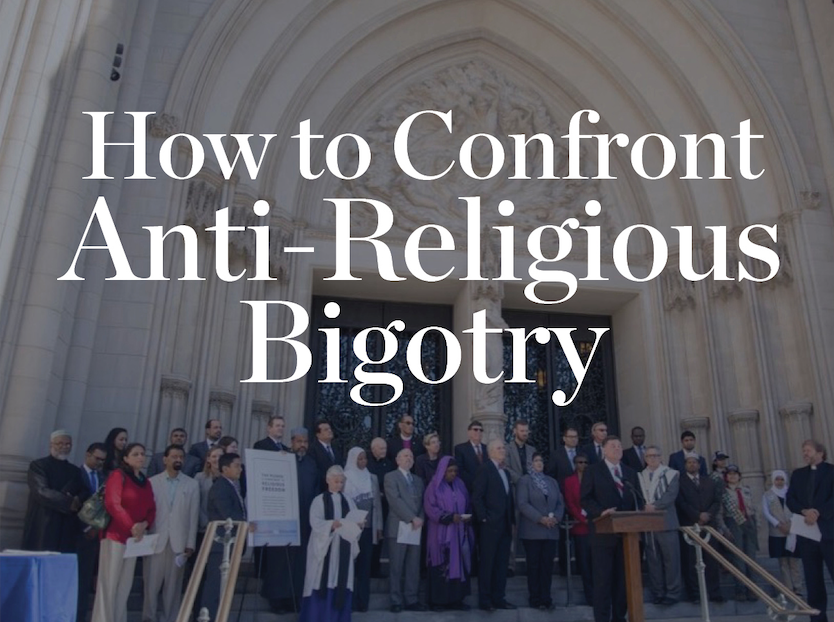For several years, the JPII Center for Interreligious Dialogue has held an annual lecture on interreligious understanding in collaboration with the Jewish Theological Seminary (JTS). Hosted by the Milstein Center for Interreligious Dialogue at the JTS and supported by the Russell Berrie Foundation, this year’s public lecture, held online, addressed an urgent issue across religious traditions: “How to Confront Anti-Religious Bigotry.”
The event was facilitated by Rabbi Dr. Burton L. Visotzky, Appleman Professor Emeritus of Midrash and Interreligious Studies and Director of the Milstein Center for Interreligious Dialogue at the Jewish Theological Seminary. Participants tuned in from around the world, including a group of about 30 religious leaders from the US National Council of Churches and the US National Council of Synagogues who were together for a two-day meeting.

The central concern of the lecture was the rise of white supremacist movements, antisemitism, Islamophobia, and hostility to religion in general.
A distinguished multifaith panel began by speaking from their own perspective about bigotry within and toward their own tradition. The three speakers, all of whom are affiliated with the Shoulder to Shoulder Campaign, a US-based, interreligious coalition to end anti-Muslim bigotry, were: Rabbi Esther Lederman, Dr. Mohamed Elsanousi, and Kathryn Lohre.
Rabbi Esther Lederman, Director of Congregational Innovation and Union for Reform Judaism, member of the Central Conference of American Rabbis’ task force on the experience of women in the rabbinate, and co-chair of the Shoulder to Shoulder Campaign, started off the panel lecture. Rabbi Lederman quoted Ambassador Deborah E. Lipstadt to emphasize the limits of measuring antisemitism through numbers and statistics. After sharing some personal stories of how antisemitism affects her family and community on a daily basis, Rabbi Lederman ended by expressing her two main concerns: first, “the enabling of antisemitism and the enabling of antisemites in our society”; and second, the role of social media in “allowing antisemitism to spread and grow.”
Next, Dr. Mohamed Elsanousi offered remarks on Islamophobia and the issue of bigotry around the Muslim community. Dr. Elsanousi, Executive Director for the Network for Religious and Traditional Peacemakers and co-founder of the Shoulder to Shoulder Campaign, began by acknowledging the reality of contemporary Islamophobia and continued by offering a theological explanation for interfaith and intercultural harmony from a Muslim perspective. Citing the Qur’an, Dr. Elsanousi stated: “We are all created equal…so that we may know one another.”
The final speaker was Kathryn Lohre, Assistant to the Presiding Bishop of the Evangelical Lutheran Church in America, Executive for Ecumenical and Inter-Religious Relations and Theological Discernment, and co-chair of the Shoulder to Shoulder Campaign. While Mrs. Lohre addressed anti-Christian persecution in different parts of the world, she also focused on bigotry perpetrated by Christians in the United States, where she connected Christian nationalism to white supremacy.
After these introductory remarks, the speakers engaged with each other in a group discussion that was concluded with some words by Prof. Adam Afterman, Director of the JPII Center. Thanking the speakers and the JTS for its continued collaboration, Prof. Afterman noted that “Although focusing on American realities, so much of what you discussed here today is relevant to many places worldwide, including here in Jerusalem.”
“Connecting theology to action is at the core of our mission,” he concluded, talking about the JPII Center and how we tackle these issues in our activities, “and educating our leaders on how to identify and address antisemitism and other forms of hatred is unfortunately a critical part of our formation.”
Watch the entire JPII Center Annual Lecture recorded here.

